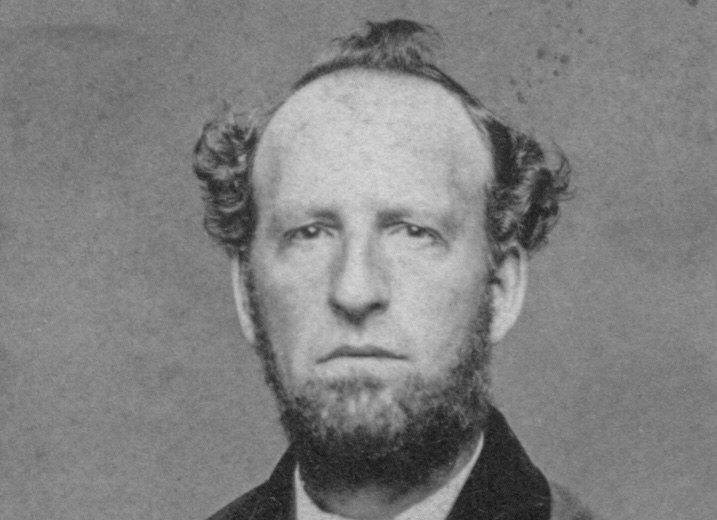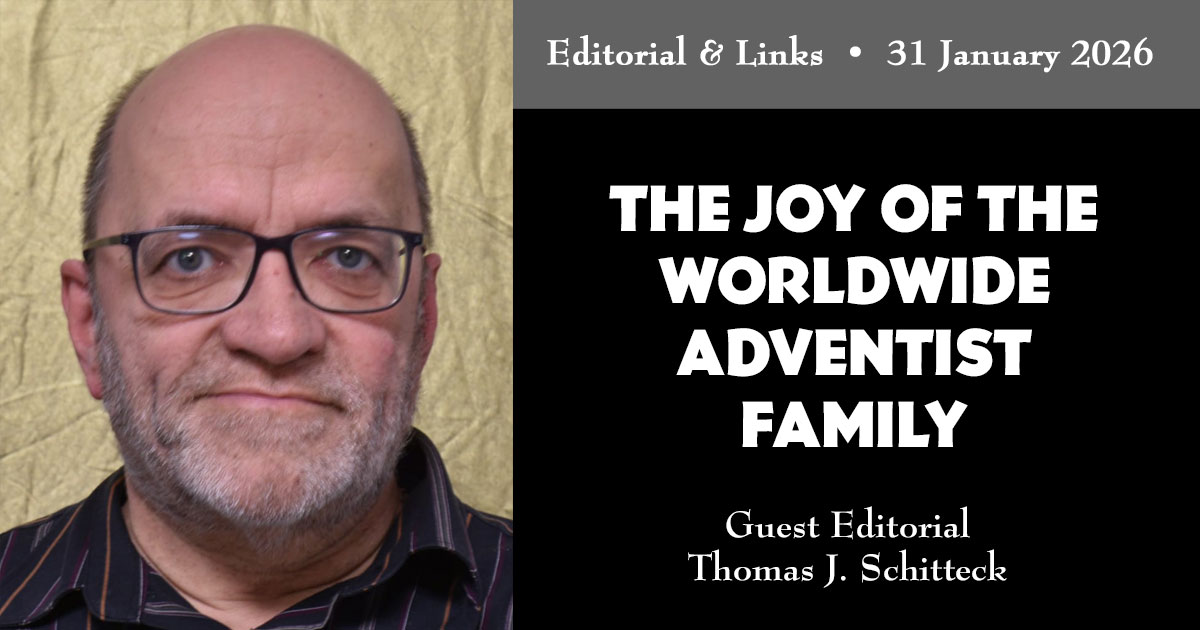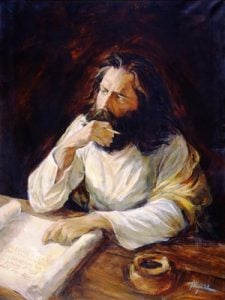Ci sono giornate in cui la stanchezza inizia prima ancora di uscire di casa. Un pensiero che pesa, un imprevisto o una parola di troppo… Gesù non ci chiede di farcela da soli. Ci invita a lasciarci sostenere dal suo amore. ✨ Scopri un nuovo modo di affrontare le sfide quotidiane, con più grazia e meno pressione. #MeditazioneCristiana #GraziaDiDio #HopeMediaItalia #ShortCristiani #FedeQuotidiana Source: https://www.youtube.com/shorts/HuLgmVWlebk
The Prophetic Messenger Prays
So the Lord spoke to Moses face to face, as a man speaks to his friend. Exodus 33:11.
[Prayer offered by Ellen White at the 1903 General Conference session.] Our heavenly Father, we come to Thee this morning just as we are, needy and wholly dependent upon Thee. Help us to have a clear knowledge of what we must be, and of the characters that we must form, in order that we may be prepared to unite with the heavenly family in the city of our God….
O my Father, how can we proclaim Thy goodness, and Thy mercy, and Thy love, unless we cherish them in our own hearts and reveal them in our own experiences? Thou knowest how Thou hast presented this matter to Thy servant….
Here are Thy ministers, whose work it is to proclaim Bible truth. I ask Thee that they may have a clear realization of the responsibilities that rest upon them as guardians and as shepherds of Thy flock…. Let them understand their own weakness, and may the sanctification of the Spirit come to them….
Here are those who bear responsibilities in our institutions…. They have not in their dealings given a right example to the world. They did not realize that others were taking knowledge of them, to see whether they were sanctified by the truth.
Oh, pardon our transgressions and forgive our sins! Show us where we have come short. Let Thy Holy Spirit descend upon us. The world is perishing in sin, and we ask Thee to roll the burden upon us at this meeting….
Thou hast opened these things before me, and Thou alone canst prepare minds and hearts to hear the message that unless those who have left their first love shall return to recognize the work that needs to be done in their individual hearts, Thou wilt come quickly and remove the candlestick out of his place….
We must be reconverted, sanctified, and made fit to bear the message of the Lord….
My Father, break down the barriers, that confessions may be made, from heart To Whom It May Concern: heart, from brother to brother. May the Spirit of God come in; and Thy blessed name shall have all the glory. Amen.—The General Conference Bulletin, April 2, 1903.
From the Heart p. 48
~~~~~~~~~~~~~~~~~~~~~~~~~~~~~~~~
Prayer Requests
—-Request prayer for my friends Son, high fever. 4 years old. BL
—-Please pray for Becky who just found out she has leukemia and Mindy who has lost two good friends this week. Michael
—-Please pray for a friend who is having all sorts of health problems. A
—-We are having problems with our car. It seems to be a loose wire in the transmission. The mechanic can’t find it. Please pray that Ron can find someone who will be able to fix it. Rose
~~~~~~~~~~~~~~~~~~~~~~~~~~~~~~~
Dear Friends,
My grandfather, Edwin Harmon, spent much of his growing up years living the life of a hobo traveling up and down the east coast of the USA by “riding the rails” in a boxcar. He met many interesting characters along the way. Some of these homeless men were very nice to him, shared their food with him, and taught him the ways of survival. He grew up tough and wiry but kept his tender heart.
The railroad companies tried in vain to stop these hobos from hopping into the boxcars by hiring men to catch all who were riding for free. One particular security guard had quite a reputation because of his size and the hard look on his face. All of the men who rode the rails were afraid of him. As they would tell one another about this man, the stories grew and grew until he became something of a legend.
At this time, Ed was in his early twenties. He had, for the most part, left his wandering life. Yet there were times when he would still ride the rails to get where he wanted to go. He had heard all the stories about that mean security guard and hoped that he would never meet him. He had faced many dangers throughout his life and was well able to take care of himself, but those stories of this man’s cruelty filled him with fear.
One day, he decided to catch a ride on the train. He knew he would have to be extra careful not to get caught. Sneaking into the railway yard, he grabbed the ladder that was at the end of a boxcar as the train went slowly by. The infamous security guard saw him. This guard had captured many other men who had ridden the rails without paying and now he was after my grandfather.
Ed held onto the ladder for a few moments before climbing up onto the boxcar. Just as his head was peeking over the top, he saw the guard coming his way. Immediately he ducked down, hoping that he had not been seen. In the few moments he had before the man got to him, he had a decision to make. The train was now going too fast for him to jump off without being hurt. He laid his plans. Climbing up the ladder when he was sure the guard was right above him, he sprung up onto the top of the boxcar right in front of the guard. Looking his meanest, he faced this huge strongman. The guard’s menacing look made the hair on Ed’s neck stand up, but he did not let his fear show. The guard told him that he was going to throw him off the train which had picked up even more speed.
In desperation, Ed told the man that he had a gun and was going to put an end to the guard once and for all. Suddenly, that big guard’s attitude changed. Even though that guard had not seen a gun, he was afraid at the mere mention of the word. The frightening look on his face turned to one of fear. His whole demeanor changed. Slowly. he backed away and left my grandfather alone for the rest of the trip. Ed was greatly relieved but could not relax. He was sure that at the next stop this guard would have the sheriff waiting for him. Later, when the train slowed while going up a steep grade, he jumped off.
How many times we are like that guard. We profess one thing, but we are quite different within. Jesus tells us, “Not every one that saith unto me, Lord, Lord, shall enter into the kingdom of heaven; but he that doeth the will of my Father which is in heaven. Many will say to me in that day, Lord, Lord, have we not prophesied in thy name? and in thy name have cast out devils? and in thy
name done many wonderful works? And then will I profess unto them, I never knew you: depart from me, ye that work iniquity.” Matt 7:21-23 Fearful thought!
Profession does no good when there is no change in our heart. Profession is worthless without the love of God dwelling inside. Whenever we do good for the wrong reason, it counts for nothing. How much we need to have a new heart. How much we need that cleansing that only Jesus can give. We cannot cleanse ourselves. It is a gift of God, Who promises, “A new heart also will I give you, and a new spirit will I put within you: and I will take away the stony heart out of your flesh, and I will give you an heart of flesh. And I will put my spirit within you, and cause you to walk in my statutes, and ye shall keep my judgments, and do them.” “I will put my laws into [your] hearts, and in [your] minds will I write them; And [your] sins and iniquities will I remember no more.” (Eph 2:8-10) Eze 36:26,27; Heb 10:16,17
May we accept God’s great forgiveness and so live that we truly become all that we profess to be is my prayer.
Rose
Source: https://rosesdevotional.org/the-prophetic-messenger-prays.html
Mark Finley on Jesus’ Love
When times are tough we catch ourselves wondering if Jesus can really love us. Just like how people can see our love in our daily lives best, we can see Jesus' love throughout His ministry on earth. We know He loves humanity because of how He served. We know He loves individually because of how He cared. We know He loves us still, because He still lives today. If you believe it, share with a friend! Source: https://www.youtube.com/shorts/R0-0rOX6Wtg
James Could Be a Jerk: Adventism’s Brilliant, Exhausting, Indispensable Pioneer

James White helped build the Seventh-day Adventist Church from a scattered, post-Millerite remnant into an actual movement with institutions, structure, and mission. Adventists believe God was guiding the whole process — but the humans He worked through were, at times, a lot. And James White may have been the most “a lot” of them all. […] Source: https://atoday.org/james-could-be-a-jerk-adventisms-brilliant-exhausting-indispensable-pioneer/
Sunday: Rejoicing in the Lord
Daily Lesson for Sunday 1st of February 2026
Read Philippians 3:1-3. What positive and negative notes does Paul sound here, and how are they related? How does he describe believers?
Paul begins on a very positive note and almost sounds as though he is wrapping up his letter. But he’s not done. He returns to one of the main themes of this epistle: rejoicing in the Lord. And he will give a number of reasons for that here. Most important, we are to have confidence in Christ, not in ourselves: “We . . . rejoice in Christ Jesus, and have no confidence in the flesh” (Philippians 3:3). Who among us has, in one way or another, learned the hard way about not putting confidence in the flesh?
The strong warning “Beware” (three times) is not found anywhere else in Scripture. Apparently, the Philippians knew very well what threat Paul was referencing. Rather than three separate problems, the warning appears to refer to a group of false teachers described in three different ways.
Wicked or irreligious people in Israel were sometimes referred to as “dogs” (Philippians 3:2; compare Psalms 22:16; Isaiah 56:10; Matthew 7:6; 2 Peter 2:21-22). False teachers could also aptly be described as “evil workers.” Referring to them as “the mutilation” (Philippians 3:2, NKJV) or “those who mutilate the flesh” (ESV) shows that, as in Galatia and other locales, they were seeking to impose circumcision on Gentile believers, contrary to the ruling of the Apostolic Council (see Acts 15:1-41).
Interestingly, it seems that one solution to spiritual challenges, including the spread of false teachings, is to “rejoice in the Lord” (Philippians 3:1; compare Philippians 4:4).
Anything we rejoice about brings us joy (as in English, the two Greek words for these ideas are related). God wants us to be joyful, and His Word is a kind of instruction manual for true happiness and lasting joy. These include receiving God’s mercy (Psalms 31:7); placing our trust in Him (Psalms 5:11); receiving the blessings of salvation (Psalms 9:14); adopting God’s law as our way of life (Psalms 119:14), including the Sabbath (Isaiah 58:13-14); believing His Word (Psalms 119:162); and raising godly children (Proverbs 23:24-25).
|
Life can be very difficult for us all, no matter how well things might be going at the moment. But even if they are not going well now, what things can you and should you rejoice about? What is stopping you from doing it? |
When it feels like evil is winning remember, God still sees. #faithjourney #hardship #encouragement
EDITORIAL: The Joy of the Worldwide Adventist Family

by Thomas J. Schitteck Recently, Adventist Today editor Loren Seibold wrote an editorial where he explained that Adventists are members of a local congregation, not the denomination. That’s a good thing to know, because it means that no one from a higher authority outside of your own congregation can exclude you. Let me add something […] Source: https://atoday.org/editorial-the-joy-of-the-worldwide-adventist-family/
God First: Your Daily Prayer Meeting #1263
Bible verse of the day: Psalm 9:10 – "Those who know your name trust in you, for you, Lord, have never forsaken those who seek you." Welcome to our Daily Prayer Meeting! This is a safe space where you are seen, heard, and prayed for. Start your day in God's presence—every day at 8AM ET, we share a short devotional from God's Word and lift your prayer requests to Him. You're not alone! Our prayer team is here to intercede with you and for you. Whether you need prayer, celebrate a breakthrough, or start your day with Jesus, you're in the right place. Share your prayer requests or testimonies of praise here: https://wkf.ms/3DBuapQ Engage with us in the comments:
• How can we pray for you today?
• Where are you watching from?
• What are you thankful for? How has God answered your prayers?
Let’s grow together in faith, hope, and love—one prayer at a time. Don’t forget to subscribe and turn on notifications so you never miss a prayer. 🔔 Share this video with someone who needs hope or tag a loved one who needs encouragement today. Today’s Message: Pastor Alfred Kwasi Asiem The Seventh-day Adventist Church has been an established denomination since 1863. It is a global Christian family with over 21 million members who hold the Bible as the ultimate authority. We are believers committed to helping people understand the Bible to find freedom, healing, and hope in Jesus. Want to learn more about the Seventh-day Adventist Church? Visit our website at: https://www.adventist.org/ Find us on social media by following the links below:
Facebook:
https://www.facebook.com/theadventistchurch
Instagram:
https://www.instagram.com/adventistchurch
Twitter/X: https://twitter.com/adventistchurch 👉 Want more prayer moments?
Watch our full playlist of daily prayer videos here: https://youtube.com/playlist?list=PL-k2Gb-DBYo–V8axD7iFUL6TFEckrhxv&si=vIljgfwrSZN6iJR2 God First, Daily Prayer, Prayer Meeting, Christian Prayer, Morning Devotional, Hope In Jesus, Bible Verse Of The Day, Prayer Request, Faith Community, Seventh Day Adventist Source: https://www.youtube.com/watch?v=LiylE7G29e0
Quando l’ansia pesa troppo #drittoalcuore
Ti capita mai di sentire un peso sul cuore? Quando l’ansia non dà tregua e la mente non trova pace… Oggi puoi fare spazio alla calma, anche solo con una piccola scelta di benessere. Silenzio, ascolto e preghiera: sono un balsamo che lenisce. #DrittoAlCuore #BenessereSpirituale #MeditazioneCristiana #HopeMediaItalia #ShortCristiani Source: https://www.youtube.com/shorts/H5LAGcXyka0
Vespers | Jan 30, 2026 | Sinners in the Hand of a Loving God
Sinners in the Hand of a Loving God — Marcus Robinson THANK YOU for your continued financial support of our Media Ministries. Please donate by visiting "https://adventistgiving.org/#/org/ANB4RC/envelope/start" and select “Media Ministries”. Connect With Us
X: RemnantSDA
Facebook: RemnantSDAchurch.org
Instagram: RemnantSDAchurch Source: https://www.youtube.com/watch?v=kY1W0LuLS7M


